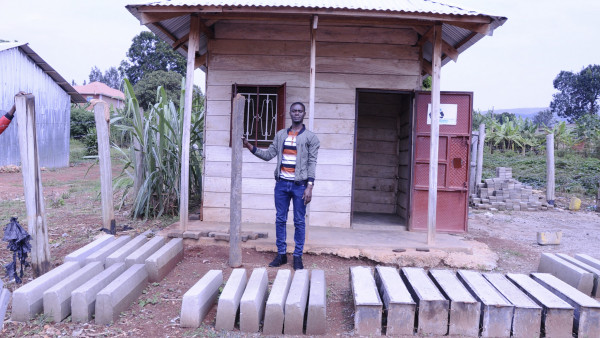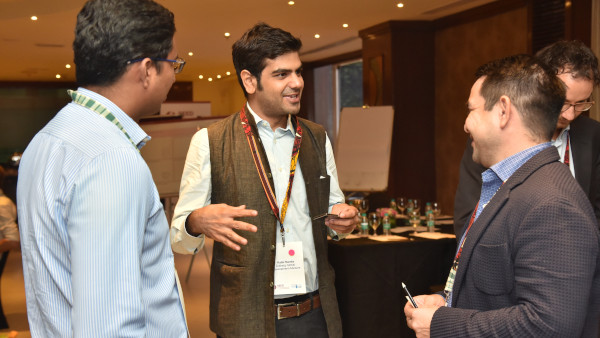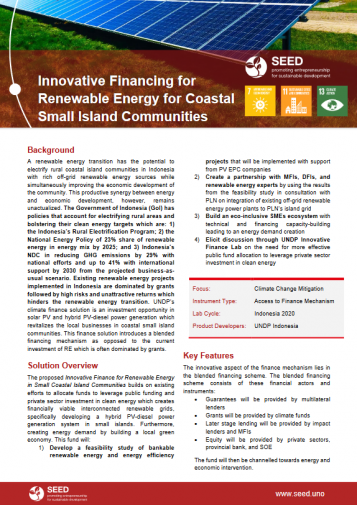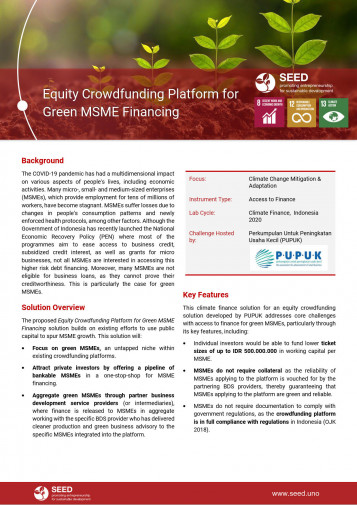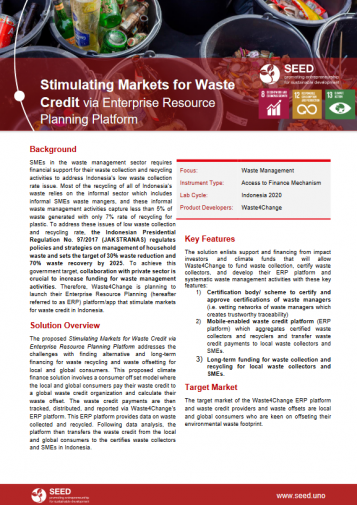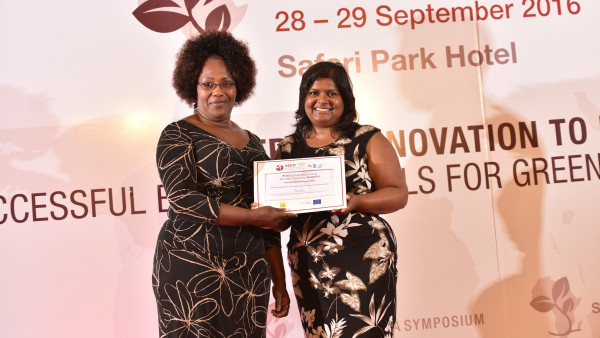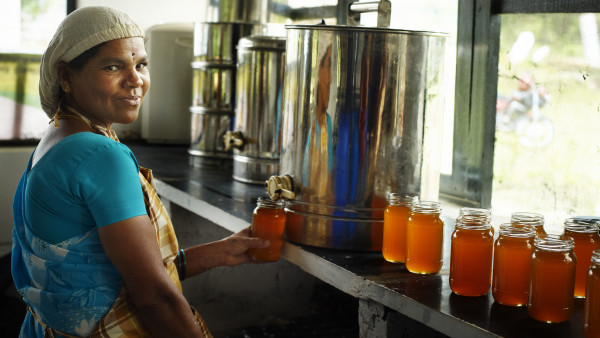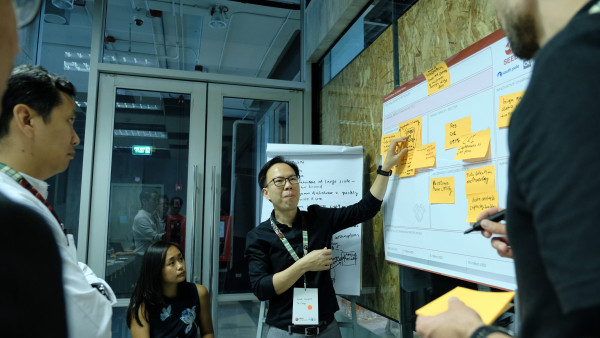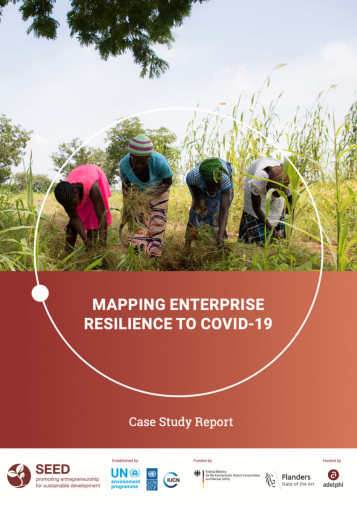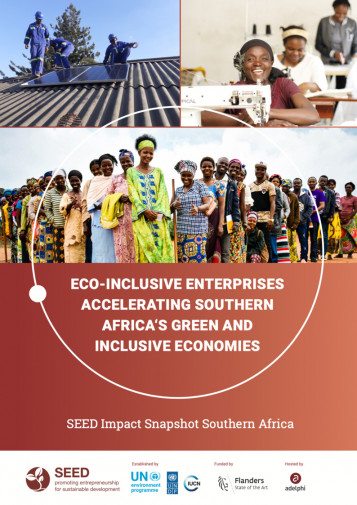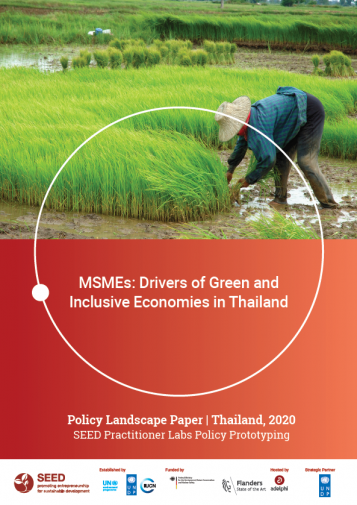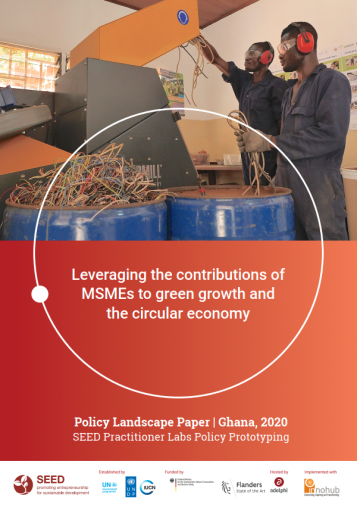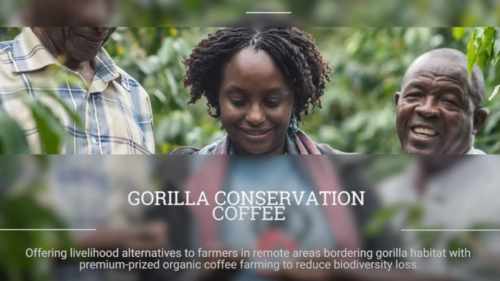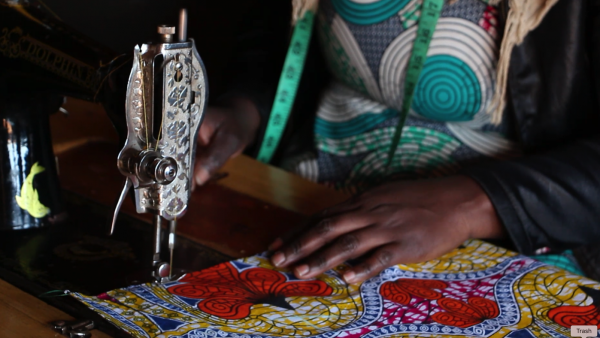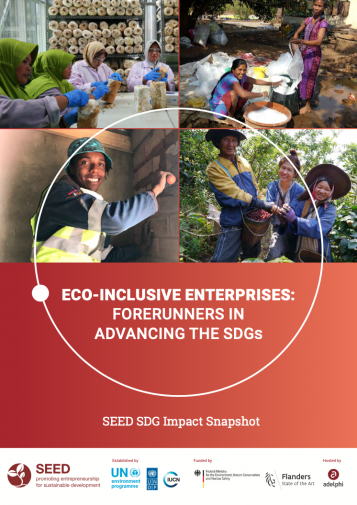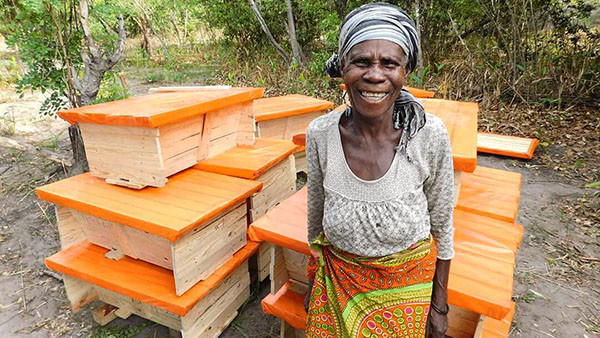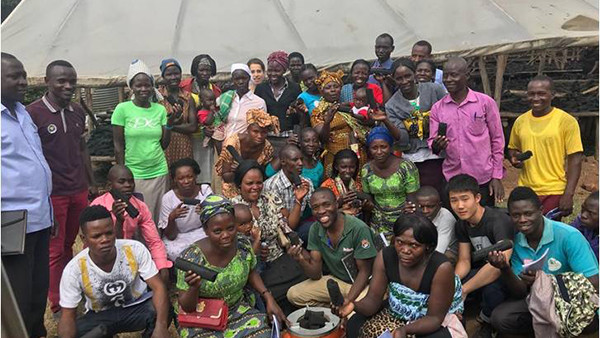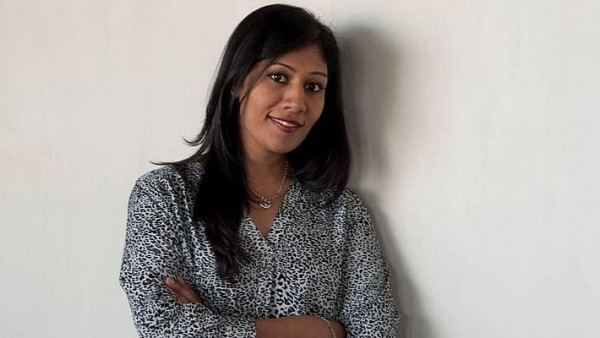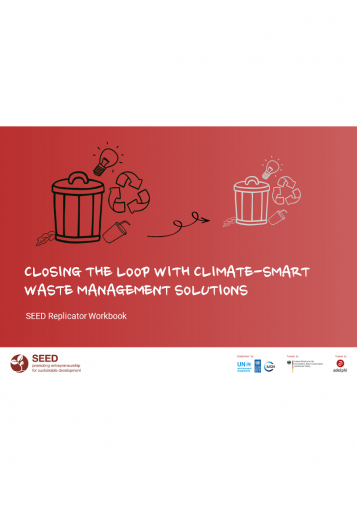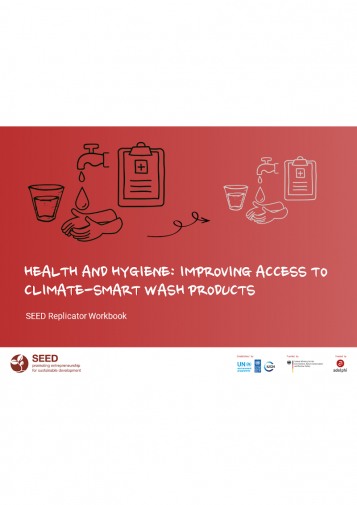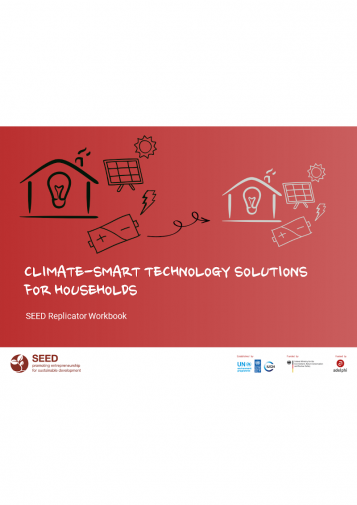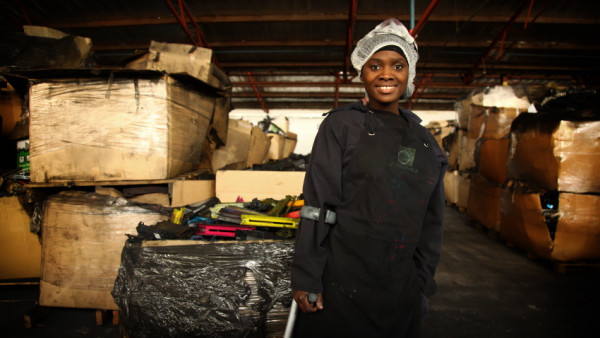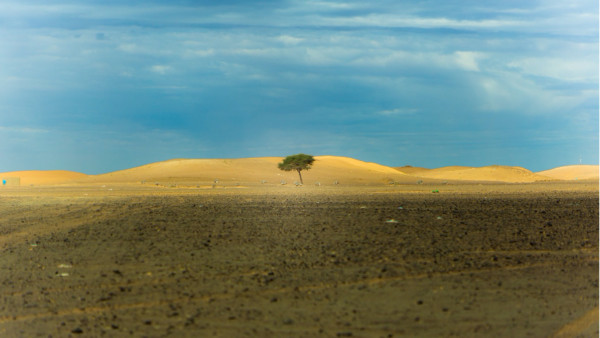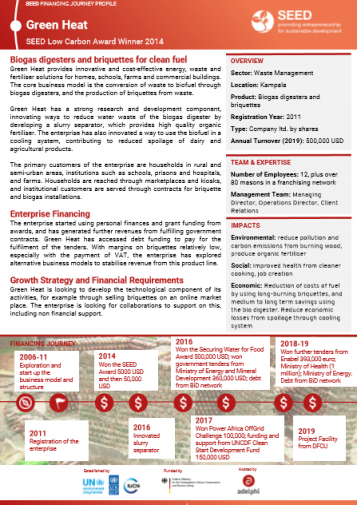NINJA COVID-19 Response and Recovery Business Challenge Winner: EcoPlastile Ltd
Published: 26 October 2020
EcoPlastile Ltd, an eco-inclusive enterprise working with youth and women to collect and process waste plastics into low-cost, durable timber substitutes, has been declared a winner for Next Innovation with Japan (NINJA) Business Innovation Challenge in response to COVID-19. Read more
Scale Up Lab, India 2020 | SEED Practitioner Labs Climate Finance
Published: 23 October 2020
Join us on 25th November for our digital Scale-Up Lab India 2020 to hear climate finance solution pitches, and learn how to get involved in driving forward these solutions! Read more
SDGs:







UNDP Indonesia's Innovative Finance for Renewable Energy in Small Coastal Island Communities | Climate Finance, Indonesia 2020
Published: 20 October 2020 Net Pornlumon Nirachatsuwan
UNDP Indonesia's Innovative Finance for Renewable Energy in Small Coastal Island Communities builds on existing efforts to allocate funds to leverage public funding and private sector investment in clean energy which creates financially viable interconnected renewable grids, specifically developing a hybrid PV-diesel power generation system in small islands. Furthermore, creating energy demand by building a local green economy. Read more
SDGs:





Equity Crowdfunding Platform for Green MSME Financing | Climate Finance, Indonesia 2020
Published: 20 October 2020 Maggie Sloan
The Equity Crowdfunding Platform for Green MSME Financing solution, developed by Perkumpulan Untuk Peningkatan Usaha Kecil (PUPUK) builds on existing efforts to use public capital to spur MSME growth. This solution will: (a) Attract private investors by offering a pipeline of bankable MSMEs in a one-stop-shop for MSME financing. (b) Aggregate green MSMEs through partner business development service providers (or intermediaries), where finance is released to MSMEs in aggregate working with the specific BDS provider who has delivered cleaner production and green business advisory to the specific MSMEs integrated into the platform. Read more
SDGs:





Waste4Change: Stimulating Markets for Waste Credit via Enterprise Resource Planning Platform | Climate Finance, Indonesia 2020
Published: 20 October 2020 Net Pornlumon Nirachatsuwan
This innovative finance mechanism distributes waste credit to waste collectors and recycling managers by creating an Enterprise Resource Planning (ERP) platform that finances the waste collection and recycling activities which offsets the consumers waste production. Read more
SDGs:





Building a Resilient Business Around Women: The story of Dagoretti
Published: 28 September 2020 Amanda Panella, Linde Wolters
Violet Matiru grew up without electricity on a farm at the outskirts of Nairobi, Kenya, an aspect of her life that led her to want to better the environment around her. From using kerosene lamps and lighting a fire every day with firewood for a cup of tea before school, she decided to support herself and her community by launching the Dagoretti Market Biogas Latrine. It has since moved from a core business of converting human waste from paid for latrines for market goers, to biogas to be reused for cooking and heating water, to other environmentally and socially relevant activities. Read more
SDGs:







Enterprise Resilience: Six Critical Factors to Protecting Your Start-Up’s Future
Published: 24 September 2020
To better understand what resilience means for MSMEs during the COVID-19 pandemic, SEED interviewed 30 eco-inclusive enterprises. Unsurprisingly, MSMEs have been strongly affected by the economic shock of the pandemic. From these interviews, SEED has outlined the six critical factors for protecting the future of your enterprise. Read more
Green Recovery Ecosystem Builder Programme: Making SME support programmes green, fair and recovery proof
Published: 10 September 2020
SMEs make up a significant portion of ASEAN economies and communities. Despite being impacted negatively by the pandemic, they are also key in driving local green and inclusive growth. The new Green Recovery Ecosystem Builder Programme is tailored for participants who lead programmes or departments and are responsible for the successful implementation of enterprise support services. Read more
Mapping Enterprise Resilience to COVID-19
Published: 07 September 2020 Elena Eckhardt, Linde Wolters, Mirko Zürker, Supapim Wannopas
Resilience is an indispensable tool to help MSMEs prepare for the unknown, especially now when COVID-19 induced curfews and lockdowns expose MSMEs to new vulnerabilities. With fewer resources and access to information than larger companies, MSMEs in emerging markets have experienced severe disruptions to their businesses, with around 42% worldwide facing potential failure within six months.
This report demonstrates how MSMEs, particularly eco-inclusive enterprises, are weathering the COVID-19 pandemic and how governments and intermediaries can lend support. In this report we outline six essential resilience factors and good practices that SEED’s eco-inclusive enterprises have employed in emerging markets. Our SEED enterprises serve as an excellent example of how other enterprises can incorporate resilience into their business models in the face of the pandemic and to become more adaptable for future shocks. Read more
This report demonstrates how MSMEs, particularly eco-inclusive enterprises, are weathering the COVID-19 pandemic and how governments and intermediaries can lend support. In this report we outline six essential resilience factors and good practices that SEED’s eco-inclusive enterprises have employed in emerging markets. Our SEED enterprises serve as an excellent example of how other enterprises can incorporate resilience into their business models in the face of the pandemic and to become more adaptable for future shocks. Read more
Eco-Inclusive Enterprises: Accelerating Southern Africa’s Green and Inclusive Economies
Published: 02 September 2020
Micro, Small, and Medium Enterprises (MSMEs) provide 50% of jobs, contribute to over 35% of the GDP in emerging economies, and overall make up 90% of registered firms across the world. They are especially impactful in emerging economies as they work toward inclusive growth and equality for marginalised populations. At SEED, we focus on growing eco-inclusive enterprises which in turn contribute socially, economically, and environmentally to empowering the 5.2 billion people at the bottom of the pyramid worldwide.
This report examines the yearly impact of 80 of our eco-inclusive enterprises in three of our SEED countries: Zambia, Zimbabwe, and Malawi. These locally embedded enterprises, 51% of which are women-led, demonstrate that driving the Sustainable Development Goals (SDGs) can indeed be profitable and with a success rate of 82.5% still in business, they show long-lasting impact in each of their communities and sectors. Read more
This report examines the yearly impact of 80 of our eco-inclusive enterprises in three of our SEED countries: Zambia, Zimbabwe, and Malawi. These locally embedded enterprises, 51% of which are women-led, demonstrate that driving the Sustainable Development Goals (SDGs) can indeed be profitable and with a success rate of 82.5% still in business, they show long-lasting impact in each of their communities and sectors. Read more
SDGs:























MSMEs: Drivers of Green and Inclusive Economies in Thailand | Policy Landscape Paper, Thailand
Published: 01 September 2020 Linde Wolters, Panramon Mahasuwan, Sonya Ong, Supapim Wannopas
As a leader in the ASEAN region, Thailand’s policy frameworks are well aligned with ASEAN initiatives, UN Sustainable Development Goals (SDGs) and Paris Agreement. Various stakeholders including those in the MSME ecosystem are working towards achieving the Thailand 4.0 industrial policy, a long-term vision to transition the country into an innovation-based economy, with a focus on technology, creativity and services. This policy landscape paper provides a brief overview of the social and environmental impact entrepreneurial ecosystem in Thailand. It serves as the background for the Practitioner Labs for Policy Prototyping hosted by SEED with UNDP Thailand as strategic partner. Read more
SDGs:







Leveraging the contributions of MSMEs to green growth and the circular economy in Ghana | Policy Landscape Paper
Published: 01 September 2020 Camilla Shearman, Doris Awortwi-Tandoh, Julia Haack, Kodjo Barnor, Letitia Varney, Linde Wolters, Thomas Wiredu
The policy context as it relates to MSMEs in Ghana is in a state of transformation. With a new MSME Policy on the horizon that seeks to align and coordinate efforts to support this stakeholder group, it is an opportune moment to look at the social and environmental contributions of MSMEs to Ghana’s development priorities, and how policy solutions can leverage these contributions. Furthermore, as MSME activities in specific sectors – for example in the waste management sector – receive increasing attention, there is opportunity for a coordinated effort to address challenges.
By bringing together different perspectives and experiences, the SEED Practitioner Labs for Policy Prototyping provides an opportunity to build partnerships and holistic solutions. Read more
By bringing together different perspectives and experiences, the SEED Practitioner Labs for Policy Prototyping provides an opportunity to build partnerships and holistic solutions. Read more
SDGs:





UN High-Level Political Forum 2020 - Eco-Inclusive Enterprises and COVID-19
Published: 05 August 2020
As momentum builds for post-pandemic recovery, eco-inclusive enterprises around the world offer inspiring examples of inspiring solutions. Learn about their response and vision for a green recovery with Frontier Markets (India), Farmerline (Ghana), Amazóniko (Colombia), Gorilla Conservation Coffee (Uganda), Kibébé (Malawi) and EcoPlastile (Uganda). Read more
Recovering better: Global opportunities to jumpstart the real economy
Published: 31 July 2020
While the coronavirus pandemic presents enormous health and economic challenges, there are also opportunities to jumpstart economies and rebuild societies through green recovery plans that are aligned with the 2030 Agenda. This was the main takeaway of a dialogue that took place at Recovering better: Global opportunities for jumpstarting the real economy #GO4SDGs, a side event at the 2020 High-level Political Forum on Sustainable Development (HLPF 2020). Read more
Eco-Inclusive Enterprises: Forerunners in Advancing the SDGs | SEED SDG Impact Snapshot
Published: 15 July 2020 Linde Wolters, Mirko Zürker, Net Pornlumon Nirachatsuwan
As governments respond to the wide-ranging problems resulting from the COVID-19 crisis, it’s worth thinking about how we may take this opportunity to shift towards a green economy. Because the way we recover from this crisis will impact our fight against climate change and our progress towards achieving the 2030 Sustainable Development Agenda.
A green recovery calls for investments in solutions that provide social, environmental and economic benefits to people, especially those in vulnerable and marginalised communities. SEED-supported eco-inclusive enterprises and other Micro, Small and Medium-sized Enterprises (MSMEs) already promote green-technologies while including low-income people in their value chain.
The SEED Impact Snapshot helps to reveal the versatility of the impact of eco-inclusive enterprises. It also helps to clarify where there is the biggest potential for their SDG contributions and how policymakers may help unlock that potential further. Read more
A green recovery calls for investments in solutions that provide social, environmental and economic benefits to people, especially those in vulnerable and marginalised communities. SEED-supported eco-inclusive enterprises and other Micro, Small and Medium-sized Enterprises (MSMEs) already promote green-technologies while including low-income people in their value chain.
The SEED Impact Snapshot helps to reveal the versatility of the impact of eco-inclusive enterprises. It also helps to clarify where there is the biggest potential for their SDG contributions and how policymakers may help unlock that potential further. Read more
SDGs:



























SMEs for an African Green Economy
Published: 14 July 2020
On July 1st, Lewis Akenji, Executive Director of SEED, participated in a webinar that showcased the work that SEED and other organisations are currently doing to build a green, fair future for Africa. The webinar was part of the African Forum on Green Economy series of webinars that ran from April to July 2020. Read more
SDGs:









Nature's Nectar Limited (Zambia) wins Energy Globe Award
Energy Globe Award Source: Energy Globe Award
The 2019 SEED Africa Award Finalist is awarded National Winner of the "Energy Globe“ World Award for Sustainability. Read more
SDGs:





Green Bio Energy Ltd (Uganda) wins Energy Globe Award
Energy Globe Awards Source: Energy Globe Awards
The 2014 SEED Low Carbon Award Winner awarded National Winner of the "Energy Globe“ World Award for Sustainability. Read more
SDGs:





Last mile distribution startup Frontier Markets raises $2.25M in Pre-Series A
Sujata Sangwan Source: Your Story
The 2014 SEED Low Carbon Award winner Jaipur-based last mile rural distribution startup, Frontier Markets, on Monday announced that it has raised $2.25 million in a Pre-Series A funding round. Read more
SDGs:





Closing The Loop With Climate-Smart Waste Management Solutions: Replicator Workbook
Published: 07 July 2020
Current amounts of waste generation and insufficient waste management affect ecosystems worldwide negatively. Thus, the waste management sector is a promising area for reducing pressure on our natural resources and carbon emissions. Managing waste through strategies such as rethinking products, reducing resource use and recycling materials contribute towards a more circular economy. Climate-smart solutions presented in this workbook transform waste into entirely new materials, such as pavement tiles, alternative house building blocks, or paper made from grass. Get inspired by proven business models around the globe and learn how to create impactful and innovative solutions around waste management for your community. Read more
SDGs:





Health And Hygiene: Improving Access To Climate-Smart WASH Products: Replicator Workbook
Published: 07 July 2020
Water is one of the main channels through which people, ecosystems and economies will feel climate change impacts. Missing access to Water, Sanitation and Hygiene (WASH) still poses challenges to people worldwide, while unsustainable products and services can have a big negative impact on both human and environmental health. Access to climate-smart WASH products & services leads to healthier lifestyles on personal and community levels while equally promoting environmental action. With eco-friendly yet innovative products, you can decrease vulnerabilities or tap into a growing market of environmentally-conscious customers. Exploit this potential and set up your own eco-inclusive enterprise providing access to climate-smart WASH products & services. Learn from proven business models around the globe and take the first steps towards offering sustainable solutions to your community. Read more
SDGs:





Climate-Smart Technology Solutions For Households: Replicator Workbook
Published: 07 July 2020
Energy production and consumption are the largest sources of global greenhouse gas emissions. Economic development will increase people’s need for access to reliable and affordable energy further. Smart energy solutions focus on making climate-smart technology available and affordable to households. These solutions have the potential to improve living conditions and strengthens the economic conditions of communities. They come from renewable sources, make use of an off-grid design, or, through their energy efficiency and conservation, avoid and reduce emissions. Innovative energy products improve accessibility to climate-smart technology and provide additional capacity-building in rural areas through technical training. Get inspired by a range of proven business models and learnings on how to set up your own enterprise to create such benefits for households in your community. Read more
SDGs:





Scaling Policy and Financial Instruments for Eco-Inclusive SME Support | SEED South Africa Symposium 2020
Published: 06 July 2020 Camilla Shearman, Maggie Sloan
On 6th May, Mr Tlou Ramaru, Chief Director of Climate Change Adaptation in the Department of Environment, Forestry and Fisheries (DEFF), welcomed enterprises, financial institutions, policy-makers, donors, and business development service providers to a Pitching Session during the online SEED South Africa Symposium 2020. This Pitching Session brought together stakeholders who have been actively designing policy and financial instruments to support the start-up and scale-up of climate-smart and socially inclusive enterprises in South Africa. Read more
SDGs:











Supporting eco-inclusive enterprises in their immediate response to COVID-19 impacts
Published: 25 June 2020 Elena Eckhardt
SEED is supporting enterprise resilience in the context of COVID-19. Informed by a series of interviews with 30 SEED-supported enterprises conducted in early 2020, SEED launched a toolkit, workshop series for eco-inclusive enterprises, as well as a Training of Trainers for Business Development Services (BDS) providers across Africa and Asia to offer much-needed support. Read more
Enterprise Financing Journey: Green Heat
Published: 18 June 2020
Green Heat (SEED Low Carbon Award Winner 2014) provides innovative and cost-effective energy, waste and fertiliser solutions for homes, schools, farms and commercial buildings in Kampala, Uganda. The core business model is the conversion of waste to biofuel through biogas digesters, and the production of briquettes from waste. Read more
SDGs:










